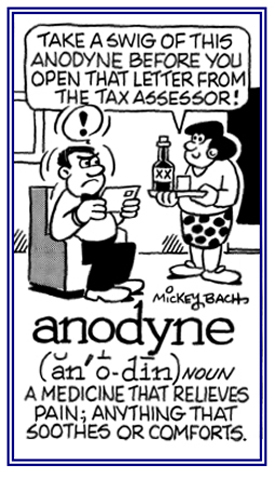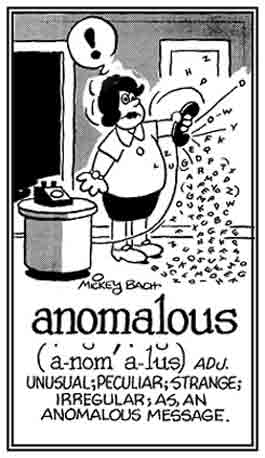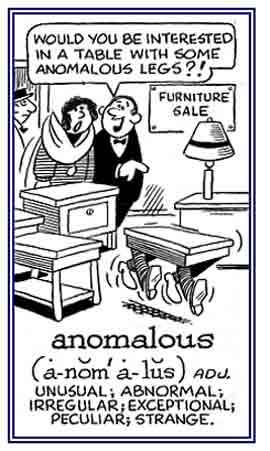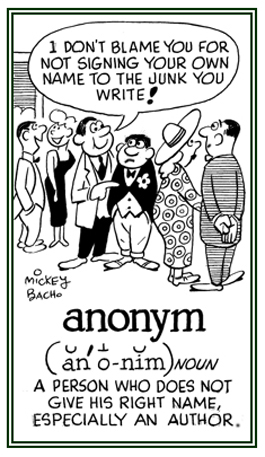a-, an-
(Greek: prefix; no, absence of, without, lack of; not)
These prefixes are normally used with elements of Greek origin, a- is used before consonants and an- is used before vowels.
It affects the meanings of hundreds of words.
There are too many words that use these prefix elements to list all of them on this site; however, there are significant examples listed in this and the other units where they exist.
A congenital absence of the teeth other than by extraction or impaction: The dentist built a set of dentures for Muriel to make up for the anodontia in her upper jaw when she was born.
A medicine or remedy that soothes or relieves pain: The doctor told Saul that there were several safe anodynes from which to choose to relieve the pain in his foot.

© ALL rights are reserved.
Go to this Word A Day Revisited Index

Go to this Word A Day Revisited Index
so you can see more of Mickey Bach's cartoons.
An extreme form or diagnosis of mental retardation: As a result of Van's brain damage after the automobile accident, he had a condition known as anoesia which required twenty-four hour nursing care.
1. Absence of recognition or knowledge: The benign expression on the faces of Brenda's audience suggested that there was a state of anoesis, in that information was being presented to their minds but not being mentally processed or understood.
2. A condition in which someone has no acknowledgement of objects: Kara's anoesis showed a state of mind that consisted of pure sensations or emotions but no recognition and understanding of what was going on.
2. A condition in which someone has no acknowledgement of objects: Kara's anoesis showed a state of mind that consisted of pure sensations or emotions but no recognition and understanding of what was going on.
anoetic (adjective), more anoetic, most anoetic
A reference to the lack of any ability to concentrate: Due to severe worries about repaying his university loan, Lamont realized that he was experiencing an anoetic condition and could not focus on his studies.
anomalous (adjective), more anomalous, most anomalous
1. Relating to the deviations from the normal rule, method, or arrangement; irregular, abnormal: When on vacation in the tropics, Doreen's brother watched in amazement as an anomalous species of fish crawled out of the water and along the ground over to a different pond.
2. Irregular; marked by deviation from the natural order and is applied particularly to congenital and hereditary defects: Dr. Celia was puzzled by the anomalous condition of Grover’s heart and wanted to discuss his health history and those of his other family members.

© ALL rights are reserved.

© ALL rights are reserved.
Go to this Word A Day Revisited Index
2. Irregular; marked by deviation from the natural order and is applied particularly to congenital and hereditary defects: Dr. Celia was puzzled by the anomalous condition of Grover’s heart and wanted to discuss his health history and those of his other family members.


Go to this Word A Day Revisited Index
for a list of additional Mickey Bach illustrations.
The inability to name objects or of recognizing and recalling their names: As a result of her increasing dementia, her friend's mother was experiencing periodic anomia and was unable to remember the names of her children.
anomic (adjective), more anomic, most anomic
1. A descriptive term for an anxious awareness that the prevailing beliefs of society have little or no personal relevance to one's living existence or condition: Hank seemed to have an anomic view of society, that none of its standards or values made any difference in his life.
2. Characteristic of a condition of society characterized by the relative absence of humane behaviors or moral standards: After the revolution, the country was going through an anomic phase when the prevailing attitude was one of immorality and lawlessness.
2. Characteristic of a condition of society characterized by the relative absence of humane behaviors or moral standards: After the revolution, the country was going through an anomic phase when the prevailing attitude was one of immorality and lawlessness.
The inability to name objects or to recognize written or spoken names of objects: Because of his stroke, the patient suffered anomic aphasia and was unable to recognize the printed or spoken words for names of people, places, or things.
1. A condition in society in which acceptable standards of conduct and belief are weak or lacking; also, a similar condition in an individual commonly characterized by disorientation, anxiety, and isolation: The anomy of the public scene was disrupted by riots on the streets; thus, breaking down the usual standards of conduct.
2. A reference to a lack of social or ethical standards when the absence of self-control has permitted desires to grow beyond all hope of satisfaction: There is such a thing as suicide that can result from suffering anomy when a person is convinced that there is no hope of satisfying his or her goals or objectives.
3. Apathy, alienation, or personal distress resulting from the loss of previously valued goals: Emile Durkheim popularized the term anomie when he listed it as a principal reason for suicide.
2. A reference to a lack of social or ethical standards when the absence of self-control has permitted desires to grow beyond all hope of satisfaction: There is such a thing as suicide that can result from suffering anomy when a person is convinced that there is no hope of satisfying his or her goals or objectives.
3. Apathy, alienation, or personal distress resulting from the loss of previously valued goals: Emile Durkheim popularized the term anomie when he listed it as a principal reason for suicide.
The absence of fingernails and/or toenails at birth: Since she was born with anonychia, she was never able to have real finger nails, but those that were attached by a manicurist covered up that fact so people generally were never aware of her condition.
1. With no name known or acknowledged: The anonym on the package gave rise to speculation as to who could be the unidentified sender.
2. Given, written, etc. by a person whose name is not disclosed: The letter to the editor of the newspaper was signed as anonym, the authorship being withheld for a reason.
3. A name used by someone to hide his or her identity: The ransom note was signed with an X which was the anonym of the kidnapper.
4. Not easily distinguished from others or from one another since there is a lack of individual features or characteristics: Harry's face was a perfect anonym because it was very bland and undistinguished from other people.

© ALL rights are reserved.
Go to this Word A Day Revisited Index
2. Given, written, etc. by a person whose name is not disclosed: The letter to the editor of the newspaper was signed as anonym, the authorship being withheld for a reason.
3. A name used by someone to hide his or her identity: The ransom note was signed with an X which was the anonym of the kidnapper.
4. Not easily distinguished from others or from one another since there is a lack of individual features or characteristics: Harry's face was a perfect anonym because it was very bland and undistinguished from other people.

Go to this Word A Day Revisited Index
so you can see more of Mickey Bach's cartoons.
Absence of sight; especially, as a result of a structured defect in or absence of an eye (or eyes): Jane, a young woman, suffered from lifelong anoxia because she was born that way.
1. A general lack or loss of appetite for food; especially, when caused by a disease: Doctors are concerned because too often anorexia is a serious medical condition in which the patient chooses to abstain from food or consumes a minimum of calories that too often result in hospitalization or premature death.
Apparently, anorexia affects girls or young women more often than males.
2. No appetite; also, a shortened term for "anorexia nervosa": Emily's cousin, who is a pediatrician, specializes in therapy for anorexia and works with young women who are unable to overcome their anxieties about food.
An eating disorder that is characterized by a false perception of one's body appearance: Anorexia nervosa leads to an intense fear of gaining weight, or being overweight, and includes the refusal to maintain an acceptable body weight.
Voluntary starvation and excessive exercising by some of those who have anorexia nervosas cause some victims to become emaciated or abnormally thin.


